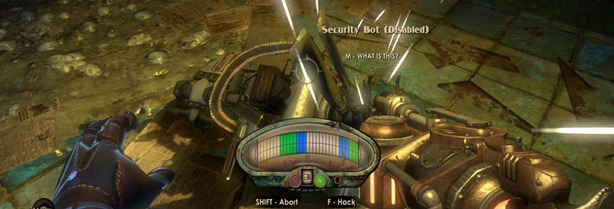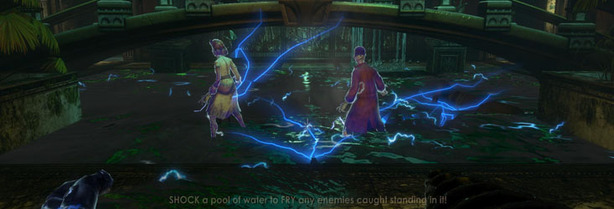
Conclusions
BioShock 2’s multiplayer is, it has to be said, a bit of a disappointment – but the game as a whole is far from being a bust. In fact, there’s an awful lot to like about the game, though it’s likely that repeat players (and hardcore PC players especially) will gloss over much of it.The problem, in part, is how jaded we all might have become and how ready we are to compare BioShock 2 to the first game before we compare it to anything else. It’s important to address that viewpoint, because it can prove enormously influential.
Take the Electro-Shock plasmid, for example. When we first found it in the original BioShock and successfully used it to electrocute a mass of Splicers as they stood in a pool of water we were awestruck. We loved it. It was the best thing to happen to us since George Lucas first imagined space-samurais with swords made of laserbeams.
Playing BioShock 2 though, we didn’t have the same reaction – even though almost the exact same situation occurred. Once more, the Electro-Shock plasmid is the first you get and you quickly learn how it can be applied to puddles for a terrific light show – but returning players will likely be nonchalant about the whole thing. It is, after all, nothing new.
While there’s definitely a solid point behind that opinion regarding how quick BioShock 2 is to emulate rather than innovate, it’s important to highlight that the underlying system is still fun regardless. Lighting enemies on fire, hacking turrets (this time without the stupid plumbing minigame) and turning ambivalent security systems against your foes – these are all fun things to do and BioShock 2 is full of this kind of content. In that respect it’s a great game even without bringing anything wholly new to the table.
Of course, it does add a few bits of flair of its own too, giving players the option to adopt Little Sisters for ADAM harvesting and expanding the game with a multiplayer portion to name a few. Storywise it introduces new characters with new philosophies too, even if they aren’t handled with the deftness and subtlety of the last cast.
Unfortunately though, the nagging voice of the former opinion – that there’s more evolution than revelation – holds truer in the long run and brings with it the reality that if you didn’t like the first game then BioShock 2 won’t change your mind.
 The actual plot is a fairly big problem too as, while the malevolent and manipulating Sophia Lamb is a truly interesting nemesis, the same doesn’t go for other characters. Tenebaum and Sinclair feel shallow and bland for the most part and, while the Big Sister shakes up boss fights a fair bit, she also feels like an obvious overstretch for the fiction. The result is that it’s a little bit harder to invest yourself in BioShock 2’s narrative that it really should be and, while it is still worth the effort at points, that is still an effort we shouldn’t have to make.
The actual plot is a fairly big problem too as, while the malevolent and manipulating Sophia Lamb is a truly interesting nemesis, the same doesn’t go for other characters. Tenebaum and Sinclair feel shallow and bland for the most part and, while the Big Sister shakes up boss fights a fair bit, she also feels like an obvious overstretch for the fiction. The result is that it’s a little bit harder to invest yourself in BioShock 2’s narrative that it really should be and, while it is still worth the effort at points, that is still an effort we shouldn’t have to make. At the end of the day, the original BioShock stood out from the crowd mainly because it was something new and interesting. The visual style, the Ayn Rand undertones, the depth afforded by the weapon and plasmid customisations and the iconic characters and artwork – all these things combined to make BioShock feel special. BioShock 2 though lacks this originality and by doing so allows many of the flaws in the original recipe to shine through.
BioShock 2 isn’t a bad game, but it lacks the vision and charm of the original title and the addition of multiplayer isn’t quite enough to redeem the game as a whole. There’s a lot of polish here, but that only gets you so far when the basics are all either stolen or sprained.
Score Guide

MSI MPG Velox 100R Chassis Review
October 14 2021 | 15:04











Want to comment? Please log in.